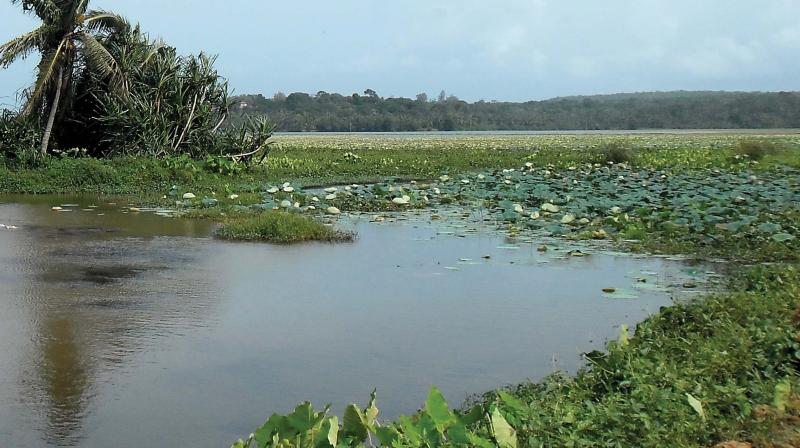Timeline set for Vellayani facelift
The destruction of the Vellayani ecosystem affects the survival of the flora and fauna of the area.

Thiruvananthapuram: The Legislative Committee on Environment has given a deadline of six months to the Revenue Department to declare Vellayani Lake and surrounding areas as Biodiversity heritage Zone. To achieve this, the Committee has recommended a series of urgent steps: evict encroachers around the 50-metre radius of the lake, takeover private lands around the lake, prohibit construction within 50 metres of the lake, wrest back the 300-odd acres of ‘puncha’ land that is now being reclaimed mostly for tourism pruposes, and initiate emergency steps to block or take out the pipes from nearby homes and institutions that drain waste and excreta into the lake.
The Committee, headed by CPI leader Mullakkara Retnakaran, has directed local authorities to raze down all cement structures within 50 metres of the Vellayani Lake. The committee, which noted in its report that the dangerous spread of lotus and water lily was polluting the lake, asked authorities to remove the weeds on the lake in a time-bound manner. The report, which was tabled during the just concluded Assembly session, said that the fresh water qualities of Vellayani was vanishing, thanks to the dumping of waste and human excreta, and the use of pesticides and chemical fertilisers by farmers. “If the lake ceases to be a fresh water source, the chances of an ecological crisis in Thiruvananthapuram district cannot be ruled out,” it said.
The destruction of the Vellayani ecosystem affects the survival of the flora and fauna of the area. As many as 36 varieties of aquatic species have been found in the lake. The lake ecosystem abounds in avian riches, too. The area is home to endangered species like darter bird, Indian cormorant, Eurasian teal, green-winged teal, blackwinged stilt, eastern golden plover, and water hen.
The Kalliyoor grama panchayat, under which the 75 sq kms of the lake falls, has already passed a stricture against construction within 50 metres of the lake. “It has been found that this directive is being violated using various means like expanding the existing buildings. Many have also gone to court against the panchayat’s directive,” the report said. The report also noted that individuals and corporates with deep pockets are buying up properties near the lake realising the tourism potential of the area. The Committee has also directed the Water Resources Department to report instances of violations to the Revenue Department, and asked the Revenue to take prompt action.
The Vellayani lake, long before parts of it were reclaimed and converted into paddy fields, was a hugely popular tourism spot during the reign of the Travancore kings. The Agriculture Office building was once a palace. Parts of this lake, which had from time immemorial sustained the state’s groundwater level and nourished its wells and ponds, is now in the possession of individuals and institutions.
During 1952-53 period, as part of the government's policy to augment food production, the Vellayani lake was given on lease to individuals for paddy farming. Initially there was bountiful harvest but with the introduction of low-quality seeds, the harvest suffered. Parts of paddy lands thus began to be used for vegetable and plantain farming. Since then, reclamation of land has been the order of the day.

